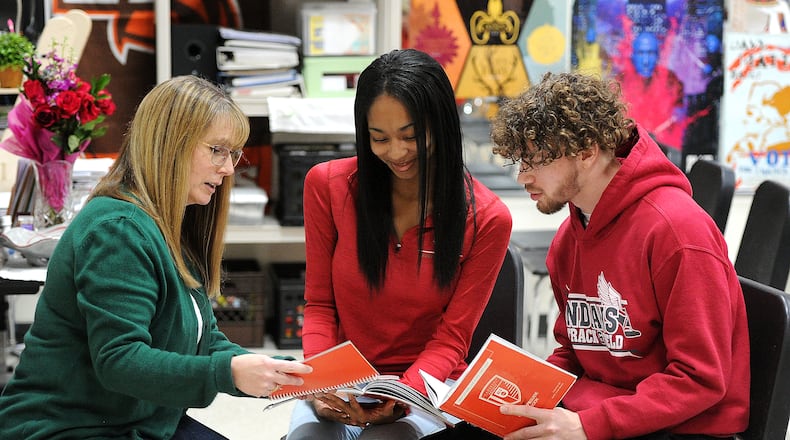The district has what they refer to as “Tribe” - their version of homeroom – throughout the year and have used the class to teach a curriculum called GOODLIFE, which is meant to teach skills like how to maintain friendships and finding ways to be grateful. It’s a way for the students to connect with each other and older students who serve as mentors.
GOODLIFE is based out of Greene County and multiple schools have the program, including Centerville, Tipp City, Xenia, Valley View, Miamisburg, Northmont and West Carrollton, said Jenny Holmstrom, support care specialist to teachers and schools.
“Good Life is about something much deeper than the things we have, the things we do or the things that we accomplish,” Holmstrom said. “Basically, GOODLIFE is a life of peace, meaning, power and success.”
As the mental health crisis in Ohio continues to go unaddressed, bringing any kind of coping skills to kids is important. GOODLIFE isn’t explicitly a mental health program, but it does have mental health benefits, said Christine Smith, a choir teacher at Stebbins who teaches a Tribe class.
Smith said the program teaches coping strategies like gratitude, figuring out ways to relax and making friends who care. Those skills can be important in preventing
GOODLIFE is an evidence-based program, using frameworks from the Search’s Institute 40 Developmental Assets and the Substance Abuse and Mental Health Service Administration. This school year, it became an official evidence-based program for prevention in Ohio.
According to GOODLIFE, between October 2022 and June 2023, student leader respondents to a survey from 14 different schools found 84% of respondents reported a “somewhat or great” increase in social emotional knowledge in students who participated in the program, and a 72% increase in resilience in students who participated. Additionally, 94% of respondents reported the program was “definitely or somewhat” easy to implement.
More than 10,700 students have gone through the program, according to GOODLIFE, and most of them have been in the Miami Valley.
The program works by having students discuss topics on the four F’s - focus, friends, freedom and future. That means focusing on within, figuring out what healthy friendships look like, deciding what choices would lead to the life the student wants and visualizing that good life.
Because it’s led by students, it also puts less of a burden on the teachers. Teachers can participate in groups, but it’s not encouraged because younger students are more likely to connect to older students.
Jadin Tolberth, a junior at Stebbins, is one of the student mentors. She said she struggled during her freshman year and didn’t understand how important her GPA was going to be, which helps her relate to the students she mentors now.
“I also struggled during my freshman year,” Tolberth said. “So they feel like they can talk to me.”
Tolberth said the program helped her as well. She was between nursing and teaching and found so much reward in mentoring kids that she’s now leaning more towards teaching.
Relationships were a big topic in January at the district because the students were working through the section on romantic relationships – something Tolberth and Christine Smith, a choir teacher who has one of the Tribe classes - say they wish they had when they were in school.
Braylon Still, another mentor at Stebbins, said the students in his mentorship class opened up to each other about relationships.
“We were able to get them in a group where I could sit out and they would just go on and on about stuff,” he said.
Eileen McClory is a Dayton Daily News education reporter.
About the Author

